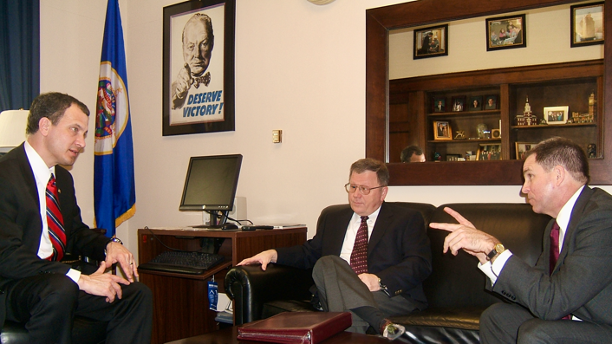
Strategic Compass: My Leadership Ethic
Act Before the Storm—Lead Like Lives Depend On It

In my congressional office, a constant reminder: Churchill’s call to Deserve Victory. Not just a poster—but a principle. Leadership means acting before the storm, not after it breaks.
-
Leadership is not about managing comfort—it’s about confronting crisis with clarity. My leadership philosophy is grounded in foresight, moral conviction, and the willingness to make difficult decisions while multiple contrasting views persist. I lead with the belief that institutions, like nations, must be guided not only by where they are, but by where the storm clouds are gathering.
-
This conviction was forged early. Reading Winston Churchill’s The Gathering Storm, I was struck by Britain’s failure to act when Hitler reoccupied the Rhineland in 1936. It was a clear treaty violation—one that Germany’s own generals believed would provoke a forceful response from the West. But no response came. The West’s choosing to act would have required leaders to push back against popular sentiment in favor of inaction, a big hurdle in that standing up to a not-yet-fully-formed but still formidable Germany might have resulted in some losses—but nothing compared to the tens of millions who died in the prolonged global conflict that inaction birthed. Inaction magnified the storm.
-
From that moment forward, Churchill’s ethic—Deserve Victory—became a guiding star for me. I carry that message on my wall and in my work. It reminds me that the role of a leader is not to wait for comfort or unanimity, but to move with principle when the stakes are highest. It’s an ethic I have carried into every role I’ve held: as a U.S. Congressman, a university president, and now a national policy strategist.
Courageous Foresight. Earned Trust. Strategic Resolve.
-
When the political alignment of the University of Colorado Board of Regents shifted, I acted early and made a deliberate decision: not to escalate or polarize, but to ensure institutional continuity. Their decision to seek new leadership was clearly a political decision, responding to partisan pressure. Had I sought to mount a public political contest over it, the resulting discord would have deeply destabilized the university. Instead, I moved with foresight to protect its long-term integrity.
-
During the early days of COVID, we moved CU online ahead of others—and a day before our first confirmed case—not because it was easy or because a consensus had formed, but because it was necessary. I’ve guided major corporations through transformations of historic scale, led through 9/11 in Congress, and built bipartisan coalitions that bridged deep divides. Across these moments, one lesson has endured: real leadership is not reactive. It is anticipatory.
The Shapeholder Ethos—Now With a Fifth A
-
In my book Shapeholders, I outlined four strategies leaders can use when facing activist, media, political, and regulatory pressures: Avert, Acquiesce, Advance, and Assemble. But recent experiences—including my transition from CU—have shown me there’s a fifth strategy worth naming: Abstain.
-
Not every provocation merits engagement. Especially in polarized environments, strategic restraint can be the most courageous act. Abstaining is not inaction—it is intentional discernment. It’s about preserving the long-term integrity of an institution rather than scoring short-term points.
-
Yet, this addition brings with it a necessary reflection. How do we reconcile the moral urgency I drew from Churchill’s Rhineland lesson—a call to respond decisively—with the idea that sometimes abstention is leadership? The answer lies in discernment.
-
True leadership is not dogmatic. It is contextual. The Rhineland required a swift, decisive response. The political shift in university governance required principled restraint. Each of the five "A"s—Avert, Acquiesce, Advance, Assemble, Abstain—has its time. Leadership is knowing which one to apply—and when. It’s not a formula, but a compass.
-
So, does the word "act" still apply when a leader abstains? I believe it does. To abstain, intentionally and strategically, is still an act of leadership. It is not idleness—it is a choice made to minimize harm, protect the mission, and guide through complexity. In this sense, "act before the storm" encompasses both assertive decisions and intentional restraint.
Shared Governance vs. Foresight-Driven Leadership
-
This tension between decisive leadership and collective decision-making is especially pronounced in higher education. Shared governance is a cherished principle—rightly emphasizing collaboration, faculty voice, and ideally, institutional consensus. But in moments of crisis or profound transformation, allowing multiple contrasting views to persist indefinitely can invite paralysis or even damage.
-
As a storm is brewing—or in the midst of it—contrasting views are normally accentuated and do not abate until living through the storm teaches profound lessons. While higher education is in the eye of one storm today, at least two others are gathering strength: the enrollment cliff and the disruptive impact of artificial intelligence.
-
Courageous foresight does not reject shared governance—it complements it. It means engaging transparently, listening actively, focusing attention on the storm clouds that are forming, and debating what actions can help the institution weather the storm. Then, when the moment demands, it means acting decisively in ways that minimize the impact of the storm. Foresight-driven leadership seeks alignment, not delay. It builds trust over time by showing that action and consultation are not mutually exclusive.
A Leadership Compass for the 21st Century
-
In an era of rising authoritarianism, fractured trust, and rapid technological disruption, we need leaders who don’t just ride the storm—they steer into it. I strive to lead with:
-
Courageous foresight to act while contrasting views persist
-
Earned trust built through listening and consistency
-
Strategic resolve that favors purpose over popularity
-
This is the ethic that guides my work across higher education, public policy, and global affairs. Because in every sector I’ve served, one truth remains: the future belongs to those who deserve victory by acting before the storm.